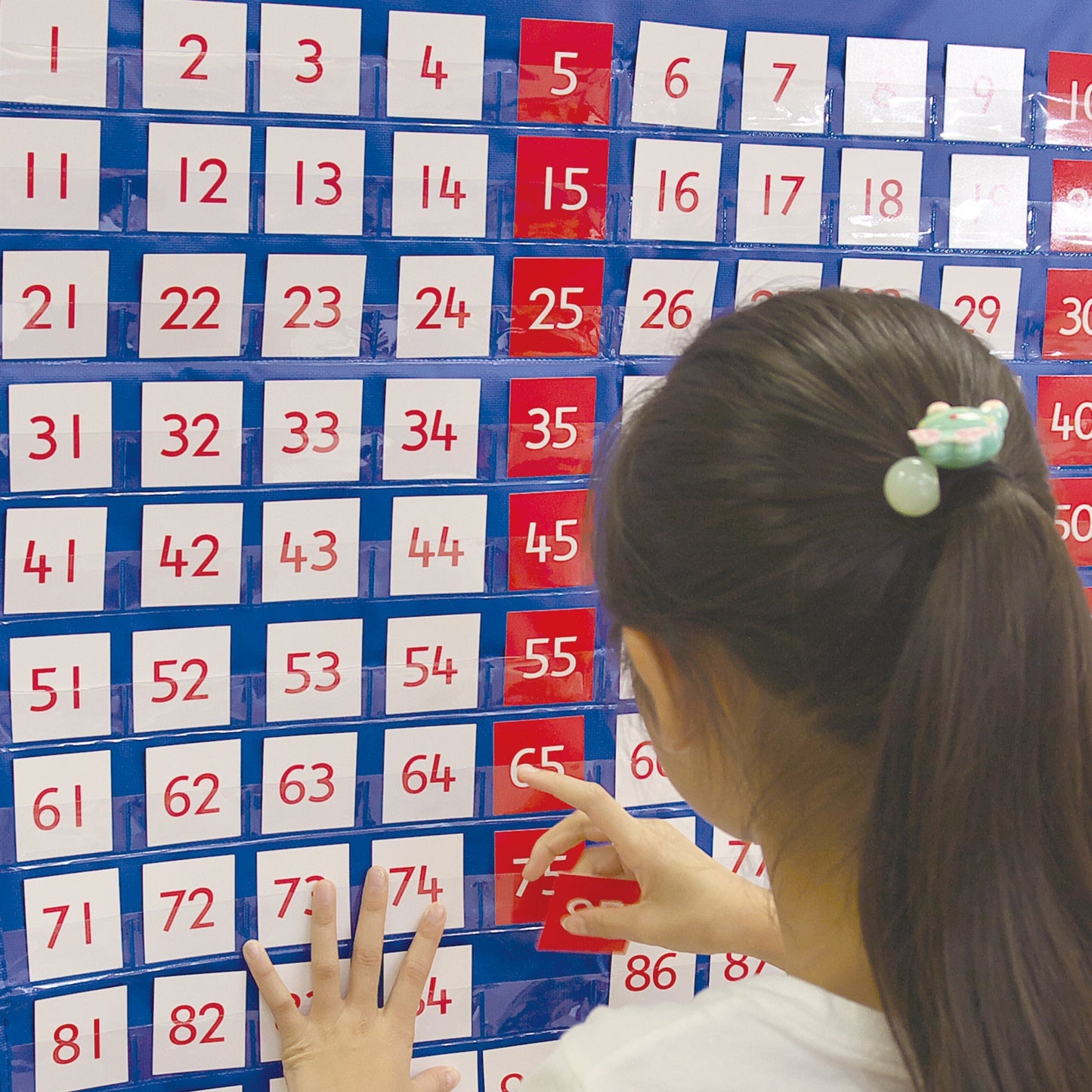
Play is one of the most powerful tools for learning in the early years. It allows children to explore, experiment, and develop essential skills naturally and joyfully. At Edx Education, we believe in the power of play-based learning, and our toys, products, and resources are designed to support children in building foundational skills in maths, creativity, and problem-solving.
One of the best tools to help children understand mathematical concepts is the Hundred Pocket Chart. This versatile resource allows children to explore number patterns, counting, place value, and more in a hands-on, engaging way. When paired with other manipulatives like Linking Cubes, Maths Cubes, Rainbow Pebbles®, and sensory play materials, it becomes an exciting learning experience that fosters creativity, confidence, and a love for numbers.
Exploring Place Value with the Hundred Pocket Chart
Understanding place value is a crucial step in early maths learning. The Hundred Pocket Chart provides a visual and interactive way for children to grasp this concept.
Try this activity at home:
- Number Recognition & Counting – Place numbers 1-100 in the pockets and encourage children to identify patterns. Ask them questions like, “What do you notice about the numbers in each column?”
- Skip Counting – Use different coloured Linking Cubes to represent multiples of 2, 5, or 10 and place them in the corresponding pockets. This helps children visually recognise patterns in multiplication and division.
- Place Value Challenge – Write numbers on small cards and ask children to separate them into tens and ones, reinforcing their understanding of the number system.
These playful activities help children grasp numbers in a concrete way before moving on to abstract problem-solving.
Hands-On Learning with Maths Cubes & Rainbow Pebbles
Children learn best through hands-on experiences. Maths Cubes and Rainbow Pebbles are fantastic open-ended toys that allow children to experiment with patterns, sorting, and problem-solving.
- Maths Cubes for Addition & Subtraction – Children can physically build and break apart cubes to explore basic number operations. This tactile method reinforces their understanding of how numbers work.
- Rainbow Pebbles for Pattern Recognition – Sorting and arranging pebbles by colour, shape, and size helps children develop spatial awareness, critical thinking, and early problem-solving skills.
Encouraging Creativity Through Play
While structured activities are valuable, free play is equally important in fostering creativity. By using a Hundred Pocket Chart, parents can introduce games that allow children to invent their own number challenges.
Some ideas include:
- Mystery Number Game – Hide a number behind a sensory card and give children clues to guess the missing number.
- Number Bonds Treasure Hunt – Fill the pockets with different number pairs that add up to 10 or 20. Children can match them up and explain their reasoning.
- DIY Storytelling with Numbers – Encourage children to create a number-based story using pebbles, cubes, and the pocket chart to illustrate their ideas.
This type of creative exploration helps develop problem-solving skills while making learning fun and engaging.
The Role of Sensory Play in Early Maths Learning
Young children thrive on sensory experiences. Using textured materials like sand, water, or playdough alongside the Hundred Pocket Chart adds another dimension to learning.
For example:
- Tracing numbers in sand – Helps develop fine motor skills and reinforces number formation.
- Filling pockets with small objects – Encourages counting and grouping skills.
- Water Play for Measurement – Experimenting with measuring cups and different volumes introduces children to early measurement concepts in a playful way.
By integrating sensory play, children are not only learning maths but also strengthening their motor skills and cognitive abilities.
Play, Learn & Create with Edx Education
At Edx Education, we champion play-based learning through our educational toys, downloadable resources, and our podcast, Play, Learn & Create with Edx Education. Through these tools, we aim to support parents and caregivers in making learning an enjoyable journey for their little ones.
By using the Hundred Pocket Chart alongside Maths Cubes, Rainbow Pebbles, Linking Cubes, and sensory materials, you can create endless opportunities for playful learning at home. When children engage in hands-on activities, they build resilience, confidence, and a lifelong love of learning—all while having fun!
By Heather Welch, Edx Education UK
